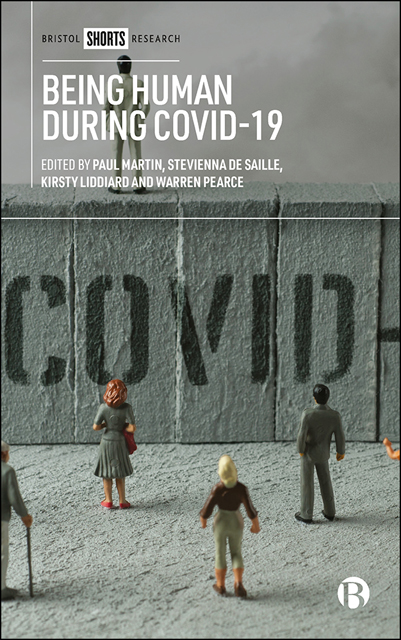seven - “Why Would I Go to Hospital if It’s Not Going to Try and Save Me?”: Disabled Young People’s Experiences of the COVID-19 Crisis
Published online by Cambridge University Press: 13 October 2022
Summary
Introduction
Throughout our co-produced project, Life, Death, Disability and the Human: Living Life to the Fullest (ESRC 2017– 2020), disabled children and young people living with shortened life expectancies have readily emphasized their human worth, value, and desire for the future. They have done so in disabling cultures that routinely deny them opportunity, access, and expectation. Perhaps not surprisingly, our conversations with disabled young people – and our interpretation of them – became more complex upon the onset of the COVID-19 global pandemic. Suddenly thrown into a moment where all lives became (more) vulnerable – an already-lived reality of many of the young people in our project – it was also a time where cultures of ableism and disablism were made more explicit, and existing inequalities exacerbated. For clarity, we use the terms ‘ableism’ and ‘disablism’ throughout this chapter. Ableism relates to the material, cultural and political privileging of ability, sanity, rationality, physicality and cognition (Braidotti, 2013), while disablism is the resultant oppressive treatment of disabled people (Slater and Liddiard, 2017).
In this chapter we share co-researchers’ own blog posts and writings on their experiences of living through a pandemic. Importantly, young people’s voices explore the (new) ways in which they have made sense of risk and threat, from the virus itself, but also from discriminatory emergency policymaking, compromised access to health resources, and a general lack of governmental support – all of which has affirmed the disposability of disabled and vulnerable lives in contexts of dis/ableism.
“I know full well in this COVID-19 pandemic that my life is not one that will be saved”: managing discourses of human worth
COVID-19 began with early public health messages that only the elderly and those with existing health conditions are most at risk of serious illness or death. Such ontologically violent messages quickly sought to reassure an overwhelmingly anxious public at the expense and distress of some of those considered the most vulnerable. Further, government ministers affirmed herd immunity as an initial key strategy: the concept of allowing publics to be exposed to a virus, in the hope that spreading it among those who are at low risk means that a large part of the population becomes immune.
- Type
- Chapter
- Information
- Being Human during COVID-19 , pp. 60 - 66Publisher: Bristol University PressPrint publication year: 2022

